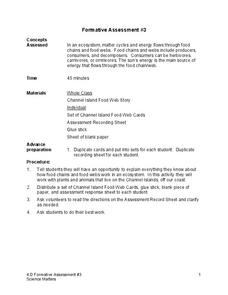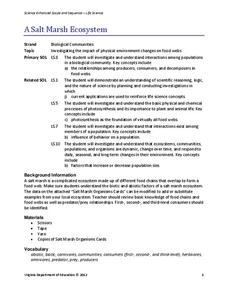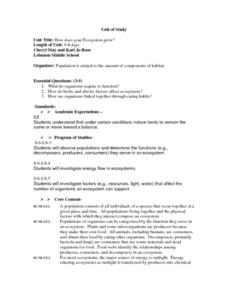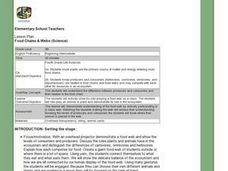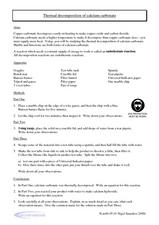Curated OER
Cellular Respiration and Photosynthesis
In this cellular respiration and photosynthesis worksheet, students read through the presented material and draw an illustration of the production of ATP. Students answer several short answer questions about the production of ATP,...
Curated OER
Naked to the Eye
Sixth graders study microorganisms. In this microorganism lesson, 6th graders explore the form and function of these organisms. Students use magnification during experiments on bread.
Curated OER
What Are Some Roles of Living Things?
In this living things worksheet, students will write in 1 main role living things play in their habitat and then write in 4 supporting details in this graphic organizer.
Biology Junction
Energy Flow in an Ecosystem
Every living thing requires a food source, thus the interconnections in ecosystems become complex. Scholars learn about these interconnections in a presentation on energy flow. It starts with the sun and moves through many different...
Science Matters
Formative Assessment #3
Thirteen short-answer questions follow a brief food web activity in a formative assessment designed to test knowledge of ecosystems and the energy that flows through them.
Shelby County Schools
How Ecosystems Work
How does one organism get its energy? What is the main source of energy in an ecosystem? How does the flow of energy affect different types of ecosystems? Answer these questions with a fill-in-the-blank worksheet.
Polar Trec
Arctic Smorgasbord!
Two blooms of phytoplankton, instead of just one, now occur in the Arctic due to declining sea ice, which will have widespread effects on the marine life and climate. In small groups, participants build an Arctic food web with given...
Kentucky School for the Deaf
Levels of Organization within an Ecosystem
From tiny organisms to entire biomes, young scientists examine the interdependent relationships tying all living and non-living things together with this collection of ecology resources.
Virginia Department of Education
A Salt Marsh Ecosystem
What a web we weave. Pupils use yarn as the primary resource to create a web depicting the intricacies of a salt marsh ecosystem. They participate in a question and answer session, which leads to an in-depth facilitated discussion about...
Virginia Department of Education
The Effects of Heat and Acid on the Enzyme Catalase
How quickly do enzymatic reactions occur? Assist the class as they examine heat and pH change to determine the rate of chemical reactions using catalase as an enzyme. Watch them "glow" with excitement!
Scholastic
Study Jams! Food Webs
Rhinozilla is back to take your lesson plan on trophic levels a step higher! After showing the video on food chains (available through the See All Related Jams button), add to it by showing this one. It deals with omnivores and food...
NASA
Biology Training Module
Are you a koalafied biologist? The lesson plan begins with research about human survival and our ecosystem. Then, an online training module simulates the effects of changes to the plants and animals in an ecosystem. Finally, scholars...
Curated OER
Worm Composting: Vermiculture
Students compost in a limited space and describe the decomposing process. Students convert unwanted, organic matter, particularly food scraps and paper into fertile soil.
Curated OER
How Does Your Ecosystem Grow?
Students consider that under certain conditions in nature tend to remain the same or move toward a balance. They observe populations and determine the functions (e.g., de-composers, producers, consumers) they serve in an ecosystem. They...
Curated OER
Food Web
Learners identify producers and consumers, including scavengers and decomposers, and discuss role each plays in food web. They then make diagram of possible food chain that might include skull pictured on Montana's quarter, and...
Curated OER
Marshland Ecosystems
Students identify animals in ecosystem depicted on 16th Century ceramic basin and classify them as herbivores, carnivores, or omnivores based on physical characteristics and prior knowledge, determine which life forms in ecosystem are...
World Wildlife Federation
Food Chains and Food Webs
As part of a study of food chains and food webs, class members complete a series of worksheets that trace a marine chain from producers to consumers or decomposers. After studying a food chain example, young marine biologists make up...
Curated OER
Forest Ecosystem
Students become familiar with the temperate rainforest. In this forest ecosystem lesson, students identify the producers, consumers and decomposers in the forest ecosystem. Students sort cards and identify the trophic level of the...
Curated OER
Food Chains & Webs
Fourth graders examine roles of animals in food chain, explore roles of humans, plants, and animals in ecosystem, create their own food webs, and role play producers, consumers, and decomposers.
Curated OER
LEAF (Learning Exercises and Activities in the Forest
Young scholars observe populations and determine the functions (e.g., decomposers, producers, consumers) they serve in an ecosystem. They investigate the energy flow ecosystems. Students investigate factors (.g., Resources, light, water)...
Curated OER
Insect Pitfall Traps
Students ask testable questions, use the inquiry cycle to investigate, gather data and interpret the results, study the diversity of insects and other smallorganisms which live around the school; they can make an inventory /collection of...
Curated OER
Thermal Decomposition of Calcium Carbonate
In this thermal decomposition of calcium carbonate worksheet, students perform three experiments on calcium carbonate, make observations and write the equations for each reaction. Students explain in detail what happened at each step and...
Alliance Theater
The Jungle Book Post-Show STEAM Lesson
An ecosystem is really just the flow of energy through many different living organisms. A study of Rudyard Kipling's The Jungle Book leads to an environmental science activity in which learners study how various factors can affect...
National Park Service
Living & Non-Living Interactions
What better way to learn about ecosystems than by getting outside and observing them first hand? Accompanying a field trip to a local park or outdoor space, this series of collaborative activities engages children in learning about the...






